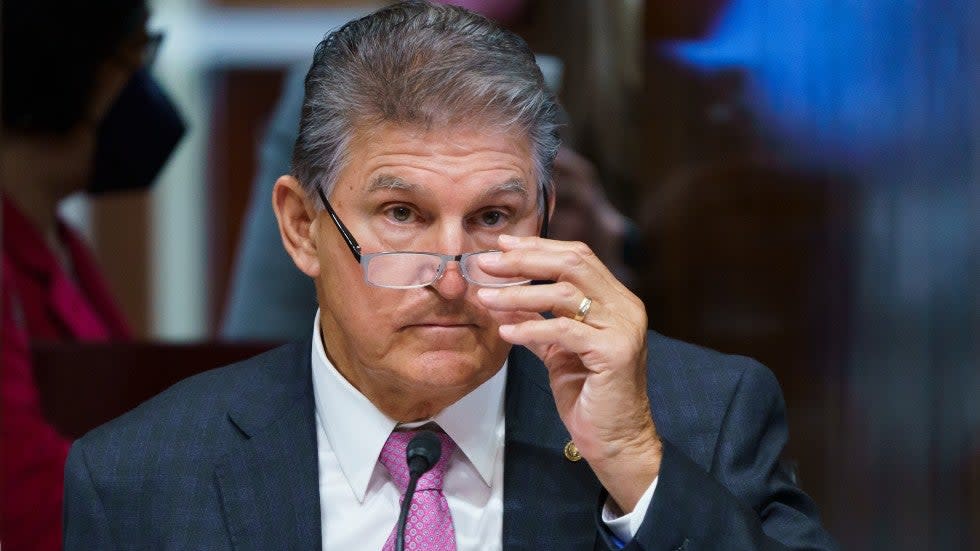Manchin knows the legalization program must be removed from the reconciliation bill

The Democrats passed their Build Back Better reconciliation bill in the House without a single Republican vote, and they aren't likely to get any Republican votes in the Senate either. Thus, whether it passes in the Senate depends on whether all 50 Senate Democrats vote for it.
At least one Democratic Senator has serious reservations about it, and I don't think he is the only one.
Sen. Joe Manchin (D-W.Va.) is concerned about a number of things in the bill, but I am going to discuss only his concern about the bill's immigration parole provision, which would provide temporary lawful status and work authorization to more than 7 million undocumented aliens who have been living here continuously for more than ten years.
Manchin is not opposed to a legalization program; in fact, he has said that he is "totally committed to trying to help" immigrants - but he does not think we should be establishing a legalization program while we are in the midst of a border crisis.
To be talking about a legalization program without border security is ludicrous. The average person turns on the TV and sees what's going on at the border, and it scares the bejesus out of him. If migrants think they can make an illegal entry and then get all the benefits that American citizens are entitled to, they're going to continue to come.
Manchin says previous immigration and amnesty proposals have included significant border security provisions to gain support from moderate Democrats and some Republicans. He would be open to that kind of deal.
That was the approach used to get bi-partisan support for the last big legalization program, which was established by the Immigration Reform and Control Act of 1986 (IRCA).
Manchin also has said that he is not going to vote to overrule the Senate parliamentarian if she recommends removing the parole provision from the bill because it doesn't come within the rules for reconciliation.
The reconciliation process was established by the Congressional Budget Act of 1974, to permit expedited consideration of certain tax, spending, and debt limit legislation.
Support from his constituents
Manchin is a West Virginia senator, and according to a Rasmussen poll released on Nov. 22, West Virginia voters overwhelmingly oppose the legalization provision in the reconciliation bill.
Survey findings -
79 percent of likely West Virginia voters are concerned about the current level of illegal immigration;
70 percent think the federal government should adopt stricter policies to reduce the flow of illegal crossings at the Mexican border;
Just 17 percent approve of the parole provision that would offer 10 years of work authorization and temporary legal status to more than 7 million illegal immigrants;
Even among Democrats, only 33 percent support it without extra enforcement to gain control of the country's border with Mexico or to deter future illegal migration;
64 percent believe that it is an amnesty provision that would encourage more illegal crossings at the border; and
65 percent would vote against a member of Congress who supports this provision without the addition of border security measures to address the current level of illegal border crossings.
West Virginia voters aren't the only ones who oppose the reconciliation bill for various reasons. A Rasmussen poll issued on Nov. 29 found that 51 percent of likely U.S. voters oppose the bill. Only 42 percent support it.
Other reasons for rejecting the legalization program
The Democrats are basing their legalization program on the parole provision in Section1182(d)(5) of the Immigration and Nationality Act, which provides the DHS Secretary with broad, discretionary authority to allow aliens who may not otherwise be admissible to the country under our immigration laws to enter and remain in the United States temporarily.
As I have noted before, the parole program in the reconciliation bill would violate restrictions in the law. The Democrats could have included an amendment to make their program permissible under the authority granted by the statutory parole provision, but they didn't.
What's more, the federal immigration system can't handle the applications it already has. As of June 30, the backlog for employment authorization was 1.36 million applications. The Democrats should provide the resources to handle that caseload before adding 7 million more.
Finally, there would be no numerical limits on how many undocumented immigrants would be able to obtain temporary lawful status and work authorization. This could become the largest legalization program America has ever had, and Democrats are trying to pass it without bipartisan support by using a reconciliation process enacted to expedite the passage of budgetary measures.
I will be very surprised if Manchin is the only Democratic Senator who votes against the reconciliation bill if the legalization program is not taken out of it.
Nolan Rappaport was detailed to the House Judiciary Committee as an executive branch immigration law expert for three years. He subsequently served as an immigration counsel for the Subcommittee on Immigration, Border Security and Claims for four years. Prior to working on the Judiciary Committee, he wrote decisions for the Board of Immigration Appeals for 20 years. Follow his blog at https://nolanrappaport.blogspot.com.

